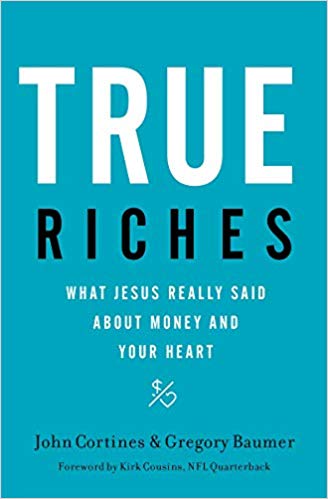True Riches Through Joyful Generosity
Co-author, latest: True Riches (Nelson Books, 2019)
Speaker
BS, Chemical Engineering, Texas A&M
MS, Geophysics, King Abdullah Univ.
MBA, Harvard Business School
Currently COO at Generous Giving
Married to Megan
Three kids
RETIRE BY 40
John Cortines was on the fast track to reach his goal of retiring by age 40. He had diligently followed wise financial rules from childhood. He saved $10,000 in high school by mowing lawns. By studying hard, he landed a six-figure job in his first year out of college. He and his wife Megan tithed faithfully and saved so much that they had saved $300,000 by age 24. John headed to Harvard Business School in pursuit of his mission. While getting his MBA, members of John’s Harvard Bible study took a course at the Harvard Divinity School called, “God and Money,” which began to solidify what God was doing in John’s heart with giving. Finishing his studies, John was offered his dream job overseas making $300,000 per year. Life was good but something was missing. John explains, “God started revealing to me the emptiness of my life in pursuit of money. Sitting in our Boston apartment on a cold, snowy day, I slowly read the twelfth chapter of Luke’s gospel over and over, the words of Jesus pierced my heart. I began to realize that… I was chasing the wind. I felt God asking me if I would consider a different kind of life: a life of joyful freedom, deep sacrifice, and heartfelt trust.” This day changed the trajectory of John’s life forever.
WRESTLING WITH GOD
Instead of taking his dream job overseas, God called John to work for a nonprofit, meaning a 65 percent pay cut. But this represented more than that. It meant living with debt, not being able to send their kids to private schools, and more. They wrestled with God over this but knew it was His plan. John shares, “We counted the cost following Jesus, and the cost was high. Be we also couldn’t deny what we were being called to do. It wasn’t quite like the fairy-tale stories of discipleship where—after a bold step of faith—sunshine and rainbows erupt everywhere as we joyfully sing praise songs. Instead, while we knew we were squarely in the middle of God’s will, we felt isolated, spiritually attacked, and alone for two full years.”
BIBLICAL GIVING
When John studied the Bible to learn how Jesus dealt with money, he found that financial success is seen in a mixed light. Jesus said he it would be hard for financially successful people to gain access to His kingdom (Matthew 19:24). Generous giving was Jesus’ mantra, but we rarely hear this kind of teaching in the Church. We are taught live the American dream but with a Christian halo on top—serve God and family, be successful, save for retirement, and give 10 percent to the Church. Yet the Bible has 2,350 verses about money, possessions, and our attitude toward them. “Even though financial wealth and stability seem to be good things, we have no record of Jesus encouraging us to pursue them. Not even once! Rather, he taught about money to inspire people toward a closer relationship with God,” John explains.” He goes on to share that it is our handling of money marked by gratitude, contentment, trust, and love that can lead to a deeper relationship with God. However, if we are chasing false riches marked by pride, coveting, anxiety, and indifference we will find ourselves joyless and further from God. “Thus, the Bible’s teachings focus less on the attainment of wealth and more on how our relationship with money forms our character,” says John.
WHERE TO START
John admits that there is nothing wrong with having nice things or enjoying life. Yet, danger comes with the continual pursuit of more with no limits. While there is no formula on how much you should give above your tithe, the challenge is to figure out what “enough” looks like for you. John explains, “The point of setting a limit is not to achieve righteousness by enacting some random rule or to enable us to cast judgment on others who spend more than we do. A poverty mindset is sinful as well… It’s easy for many people, including us to become overly harsh toward our spouses or other close friends, criticizing the smallest spending mistakes. That doesn’t make us wise or frugal. It just makes us jerks! The balance we’re after here is joyful, grace-filled simplicity.” Instead of asking “How much do I need to give?” try asking “How much do I need to keep?”
PERSONAL GIVING
John Cortines and Greg Baumer co-wrote the book, True Riches. They both have what they call “financial finish lines.” They have decided what their cap on spending each year will be and anything over and above that is allocated to give.
For example, they won’t spend more than $100,000 a year for their entire family (John has a family of five). That is enough for them to live a comfortable life but not a lavish one. They have decided what is “enough” for their families but also they keep in mind the hurting and downtrodden in society who Jesus commands us to help.


